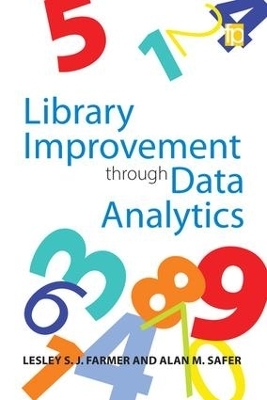
Library Improvement through Data Analytics
Facet Publishing (Verlag)
978-1-78330-161-4 (ISBN)
This book shows how to act on and make sense of data in libraries. Using a range of techniques, tools and methodologies it explains how data can be used to help inform decision making at every level. Sound data analytics is the foundation for making an evidence-based case for libraries, in addition to guiding myriad organizational decisions, from optimizing operations for efficiency to responding to community needs. Designed to be useful for beginners as well as those with a background in data, this book introduces the basics of a six point framework that can be applied to a variety of library settings for effective system based, data-driven management. Library Improvement Through Data Analytics includes: - the basics of statistical concepts - recommended data sources for various library functions and processes, and guidance for using census, university, or - - government data in analysis - techniques for cleaning data - matching data to appropriate data analysis methods - how to make descriptive statistics more powerful by spotlighting relationships - 14 practical case studies, covering topics such as access and retrieval, digitization, e-book collection development, staffing, facilities, and instruction. This book’s clear, concise coverage will enable librarians, archivists, curators and technologists of every experience level to gain a better understanding of statistics in order to facilitate library improvement.
Dr. Lesley S. J. Farmer, professor at California State University, Long Beach (CSULB), coordinates the Librarianship Program. She earned her MS in library science at the University of North Carolina at Chapel Hill, and received her doctorate in adult education from Temple University. She has worked as a librarian in K–12 school settings, as well as in public, special, and academic libraries. She chairs the International Federation of Library Associations and Institutions’ School Libraries Section and is a Fulbright Scholar. Dr. Farmer received the American Library Association Beta Phi Mu Award for distinguished service and library education, as well as several other professional association awards, and national and international grants. Farmer’s research interests include information literacy, assessment, and educational technology, especially digital citizenship. A frequent presenter and writer for the profession, Farmer has published over 30 professional books and more than a 100 professional book chapters and articles.
PART I: OVERVIEW 1. Introduction 2. Planning with Six Sigma PART II: SIX SIGMA STEPS 3. Defining the Project 4. Measure the Current Situation 5. Analyze Existing Processes 6. Improve or Introduce the Process 7. Control the Process PART III: A STATISTICS PRIMER 8. Cleaning Data 9. Getting Started with Statistics 10. Matching Data Analytic Methods to Data 11. Statistical and Survey Software for Libraries PART IV: CASE STUDIES 12. Access and Retrieval: Case Study 13. Benchmarking Library Standards: Case Study 14. Data Sets: Case Study 15. Digitization: Case Study 16. Ebook Collection Development: Case Study 17. Facilities: Case Study 18. Information Audit: Case Study 19. Instruction: Case Study 20. Knowledge Management: Case Study 21. Lending Devices: Case Study 22. Marketing Virtual Reference Services: Case Study 23. Optimizing Online Use: Case Study 24. Reference Staffing Patterns: Case Study 25. True Costs of Acquisitions: Case Study with Implications for Selection Practice
| Erscheinungsdatum | 11.07.2016 |
|---|---|
| Verlagsort | London |
| Sprache | englisch |
| Maße | 152 x 228 mm |
| Gewicht | 125 g |
| Themenwelt | Informatik ► Datenbanken ► Data Warehouse / Data Mining |
| Sozialwissenschaften ► Kommunikation / Medien ► Buchhandel / Bibliothekswesen | |
| ISBN-10 | 1-78330-161-9 / 1783301619 |
| ISBN-13 | 978-1-78330-161-4 / 9781783301614 |
| Zustand | Neuware |
| Haben Sie eine Frage zum Produkt? |
aus dem Bereich


